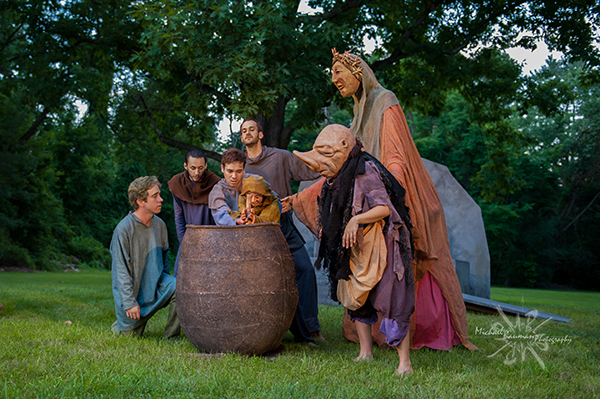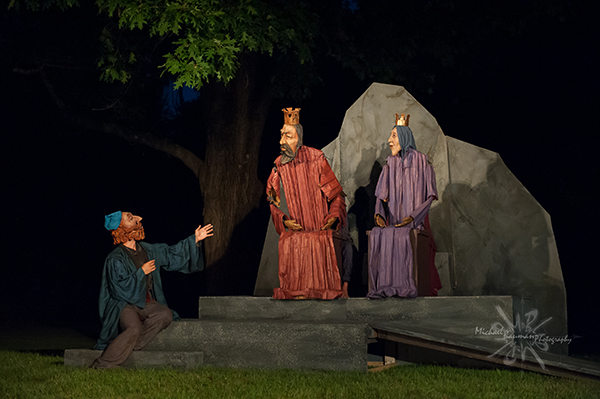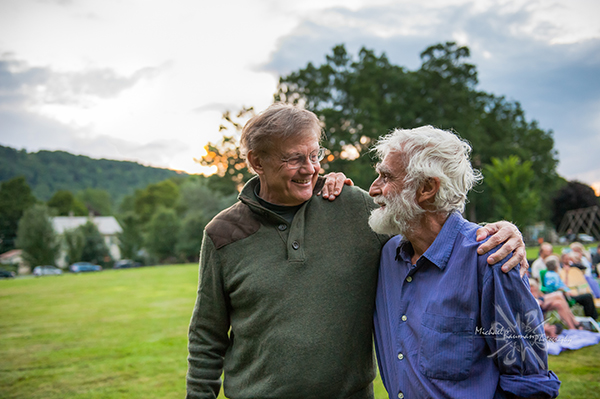Article by Katherine Duke ’05
Photos by Michael Bauman
On a warm July evening, on the grassy lawn of the Wilder Observatory, six actors and a musician from the Mettawee River Theatre Company gathered in front of an audience of all ages and used puppets and poetry to bring a medieval Welsh tale to life. Taliesin—which blends mythology and real historical figures—tells of a boy magically reborn as a sorcerer-poet and adopted by a fisherman and his wife, who uses his extraordinary gifts to shake things up in the king’s court. The performance was the result of a joint effort between two theater professionals who first collaborated at Amherst College more than 55 years ago.

Actors and puppets from the Mettawee River Theatre Company, during a production of Taliesin on the Wilder Observatory lawn
Robert Bagg ’57 and Ralph Lee ’57 lived together in Phi Alpha Psi, which Lee describes as a fraternity full of “freethinkers” and “people who were into music and fine arts.” Lee had grown up in Vermont, putting on puppet shows, designing masks for the local Halloween parade and performing at Middlebury College, where his mother taught modern dance. Bagg was a fledgling poet and scholar of Greek, learning from such Amherst professors as James Merrill ’47 and Robert Frost. Senior year, Bagg translated Euripides’ satyr play The Cyclops; Lee directed the production and created masks for all the characters. According to Bagg, Lee then encouraged him to write a play based on The Odyssey, and together they dramatized its Nausicaa episode.
“That undergrad exposure to Greek drama set me off on a lifelong career vector, translating the Athenian playwrights into contemporary speech,” Bagg writes in his Amherst Alumni Directory profile. To date, Bagg’s translations of eight plays by Euripides and Sophocles have been the basis of nearly 70 productions around the world. His Oedipus the King and Antigone are included in The Norton Anthology of World Literature, and his Antigone in the forthcoming second edition of The Norton Anthology of Drama. Bagg also taught at UMass for many years and has published numerous collections of original poetry. His current major project is a critical biography of poet and Amherst lecturer Richard Wilbur ’42 (an excerpt from which appeared in the Summer 2012 issue of Amherst magazine).

Lee’s path after Amherst led him on a Fulbright Scholarship to study mime and modern dance in Paris, followed by a year at the London Academy of Dramatic Art. Then he found employment as an actor, mask-maker and designer in New York City, creating props and puppets for Shari Lewis’ TV show and the “Land Shark” for the iconic Saturday Night Live sketch, as well as working with numerous theater and dance companies. While teaching at Bennington College in the mid-1970s, Lee staged a theatrical event with giant puppets all over the campus and realized that “they took on a very vibrant life when they were outdoors.” This inspired him to found and direct the Greenwich Village Halloween Parade, for which he won an Obie Award in 1975, and to sign on as artistic director of the Mettawee in 1976.
Based in Salem, N.Y., and Manhattan, the Mettawee specializes in shows with “large puppets and visual effects that are especially arranged for the out-of-doors. And a lot of the plays are based on myths and legends from one culture or another, which all really have a lot to do with the forces of nature,” Lee says. “To be out there in nature, and perhaps have … an incredible moon come out toward the end of your show, or a blue heron fly out of the swamp that’s in the area behind where you’re performing—little surprise events like that just tend to contribute something marvelous.”

Early this year, Lee sought someone to script the Mettawee’s planned Taliesin show. “I was really looking for a poet, because it’s all about poetry and inspiration,” he says. “That’s why I called Bob.” Bagg was at work on the Wilbur biography, but he decided he owed a favor to the friend who had led him into the world of Greek drama. So Lee and his wife, costume designer and founding Mettawee member Casey Compton, wrote up a scenario, which Bagg fleshed out with dialogue and lyrics, based on existing translations of the Welsh folklore and the writings of at least one real medieval poet who went by the name Taliesin. For several months, they collaborated mainly by phone and computer—Bagg sending drafts from his home in Worthington, Mass., and Lee giving feedback from New York, where he was rehearsing with the actors, creating masks and puppets out of papier-mâché,cardboard and a variety of other materials
In July and August, the Mettawee took the show on the road, performing on lawns and in parks throughout New York, Vermont and Massachusetts. The Wilder Observatory show was part of the Kō Festival of Performance, which takes place every summer on the Amherst campus; the Mettawee has been involved with the festival for some 20 years. Lee appreciates the many features of the Observatory lawn that make it a great venue for a play: it’s tucked away from the noises of the street, the surrounding trees enhance the acoustics, and the ground slopes gently, giving the audience a better view.
“And occasionally,” he adds, “there are still some old friends of mine from my Amherst days that will show up, which is really wonderful.”
This time, it was Bagg who showed up, not just as a name credited in the program but as a viewer in the crowd as well. He declared the show “just about perfect.”

Robert Bagg '57 (left) and Ralph Lee '57 at a production of Taliesin in Shelburne Falls, Mass.
The Mettawee River Theatre Company’s summer season will culminate in September with several performances of Taliesin at Manhattan’s Cathedral Church of Saint John the Divine, where Ralph Lee ’57 is a longtime artist-in-residence.